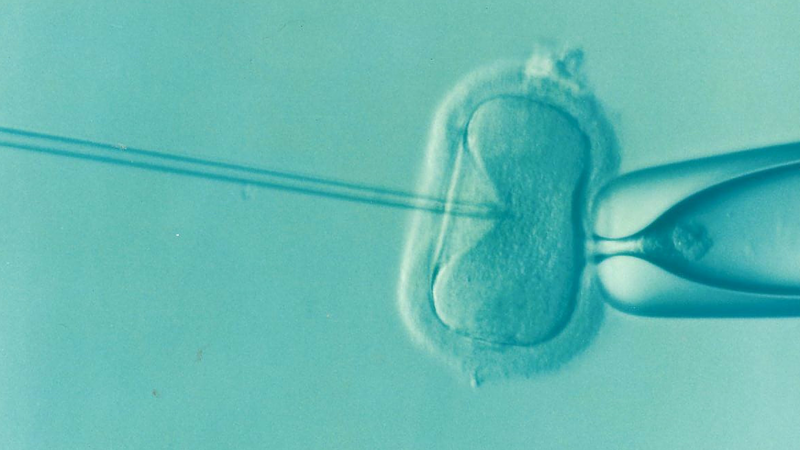IVF and the Cross of Not Being Able to Conceive a Child, by Dr. Jeff Mirus

The Brew: Remembering the Liberation of Auschwitz, by Al Perrotta
January 28, 2025
Trump Lights Up the World, by Sheryl Collmer
January 28, 2025
IVF example. July 14, 2016.. This file is from Pixabay, where the creator has released it explicitly under the license Creative Commons Zero (see here). File ID: 1514174 Creative Commons CC-Zero. This file is made available under the Creative Commons CC0 1.0 Universal Public Domain Dedication.
By Dr. Jeff Mirus, Catholic Culture, Jan 27, 2025
Jeffrey Mirus holds a Ph.D. in intellectual history from Princeton University. A co-founder of Christendom College, he also pioneered Catholic Internet services. He is the founder of Trinity Communications and CatholicCulture.org.
 Many couples do not want to have children nowadays, having been conditioned by the psychoses of a society which fears the restriction of our ability to exercise the fullest possible autonomy. I wish more of those who have gone down this essentially barren path would write honestly about their sense of emptiness as they age. Of course, this wish does not imply that everyone is called to marriage and family. A vocation, to be discerned well, must be discerned in prayer. But there can be little question that, in the modern West, an exaggerated emphasis on personal autonomy as the key to happiness causes many to refuse the deeper joys of family life.
Many couples do not want to have children nowadays, having been conditioned by the psychoses of a society which fears the restriction of our ability to exercise the fullest possible autonomy. I wish more of those who have gone down this essentially barren path would write honestly about their sense of emptiness as they age. Of course, this wish does not imply that everyone is called to marriage and family. A vocation, to be discerned well, must be discerned in prayer. But there can be little question that, in the modern West, an exaggerated emphasis on personal autonomy as the key to happiness causes many to refuse the deeper joys of family life.
On the other hand, there are many couples who are both open to and desirous of children who find themselves frustrated by an inability to conceive. This can be a heavy cross; it can also lead to a sense of having been judged unworthy by God, which is not the case at all. Having genuinely desired children, and having been frustrated in that desire, such couples can be secure in the assurance that Our Lord and Savior has willed for them a different form of fruitfulness that they must continue to discern in prayer.
Nonetheless, the inability to conceive and bear children is not only a genuine cross but also the failure of a natural process which married couples have every reason to seek to correct. Childlessness is not a Divine punishment, and if having children requires extra effort or some form of remedial care, this too lies along the very positive path of discerning God’s will. Some may find a solution to an impediment to conception, others may have recourse to adoption—and some who have adopted have also conceived after they have adopted.
But of course there are moral lines that may not be crossed. It is immoral to steal the child of another (one recalls the famous judgment of Solomon which resolved just such a case, as recounted in 1 Kings 3:16-28). It is immoral to hire a surrogate “husband” or “wife” to help to conceive and/or to bear a child. And it is immoral to resort to in vitro fertilization.
The wheat and the chaff
Marital love and the conception of children within marriage rules out unnatural alternatives, among them in vitro fertilization, which is probably the least understood morally. For there are two moral problems with IVF. The first is that the conception of the child is reduced to a mechanical process divorced from the intimacy of marital love. It would, of course, take a significant exploration of this aspect of the problem to convince many people because the moral deficiencies may not be immediately obvious.
It is fairly clear that it is undesirable to separate conception from the human act of love which God has designed; it is probably easy for most people to see that the willful separation of conception from marital coupling is wrong—for example, in the case of a woman who wants to have a child but does not want to be married. But it is not so easy to see that it is also very wrong for a married couple to separate conception from the conjugal act when they are not able to conceive a child through what we might call the path of loving embrace.
I affirm that this is wrong because it substitutes a process of mechanistic intervention for the natural coupling proper to marriage. But I do not wish to belabor that more difficult point here because it is not necessary. Rather, it is sufficient for the present to recognize the more obvious moral problem with in vitro fertilization, namely the production of numerous children (human embryos) who will simply be…murdered.
This is why the refusal to go down the path of in vitro fertilization is, in the desperate circumstances of a married couple who deeply desire children, an act of considerable courage and virtue. Genuine love refuses to do evil even to achieve some good. And that principle applies to both more and less obvious problems. Just as it is evil to rob a bank in order to enjoy a broad range of otherwise legitimate human goods, it is also evil to will the death of other innocent human persons in order to be able to nurture the one you prefer.
The point here is that while anybody may morally choose to save one of a number of endangered human lives, nobody may morally participate in a process which produces a number of human persons with the intention of choosing one to nurture and condemning the others to death.
Bishop Burbidge’s pastoral letter
These considerations, morally reviewed in desperate circumstances, require what we might call an “heroic witness to true love”. Or perhaps not what we might call it, but what Bishop Michael Burbidge of Arlington, Virginia has already called it in his January 25th pastoral letter, “The Christian Family, In Vitro Fertilization, and Heroic Witness to True Love”. Bishop Burbidge acknowledges the suffering of those couples who are unable to conceive despite repeated efforts, and he also recognizes the widespread ignorance of the true nature of in vitro fertilization in terms of the number of human beings it destroys. As he puts it:
For every one of the more than 12 million children born by means of IVF since 1978, there are many tens of millions more missing brothers and sisters who have been either deliberately destroyed, experimented upon, or frozen in liquid nitrogen and denied their natural right to the fullness of their development.[11] Every successful IVF procedure results in a living child with many missing siblings.
Indeed, sometimes IVF children have later learned how many have been murdered so that they could come to be, which is itself a heavy cross to bear. It is important, therefore, that Bishop Burbidge insists on a recognition of the dignity of each person who is conceived through IVF. But he also recommends that, even if we cannot now end the practice here in America, we should at least begin to combat it by placing controls over the procedure as many countries in Europe have (surprisingly) done. While advocating a reduction and end to this grave evil, however, he never underestimates the need for a genuine spiritual care for those couples who have resorted to it, and indeed for all couples who desire children:
I ask all people of faith and goodwill to pray for those married couples experiencing infertility, for the efficacy of life-affirming fertility care, for an openness to God’s love and an ever-deeper experience of the virtues, and for the grace to accept whatever God’s will may be.




